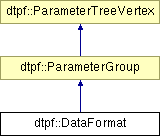
#include <DataFormat.h>
Inheritance diagram for dtpf::DataFormat:

DataFormat provides grouping and management of Parameters describing the data being transferred over a connection between two Nodes and the potential formats for a connection endpoint.
Public Member Functions | |
| DataFormat () | |
Create an empty, unnamed DataFormat. | |
| DataFormat (const muscle::String &name) | |
Create an empty, named DataFormat. | |
| DataFormat (const DataFormat &that) | |
Create a deep copy of an existing DataFormat, including all child Parameters. | |
| virtual | ~DataFormat () |
Delete a DataFormat and any memory it owns. | |
| DataFormat & | operator= (const DataFormat &that) |
Assign a DataFormat from another. | |
| bool | operator== (const DataFormat &that) const |
Compare against another DataFormat for equality. | |
| bool | operator!= (const DataFormat &that) const |
Compare against another DataFormat for inequality. | |
| status_t | Compatible (const DataFormat &that) const |
Compare against another DataFormat for compatability. | |
| DataFormat * | Intersection (const DataFormat &that) const |
Retrieve the intersection of two DataFormats. | |
| DataFormat * | Default () const |
Get a DataFormat with Parameters representing the default values for this DataFormat. | |
| virtual uint32 | TypeCode () const |
Get the type code for the DataFormat class. | |
| virtual uint32 | FlattenedSize () const |
Returns the number of bytes needed to store a DataFormat object in its current state. | |
| virtual void | Flatten (uint8 *buffer) const |
Write a DataFormat's state to a byte array. | |
| virtual status_t | Unflatten (const uint8 *buffer, uint32 size) |
Set a DataFormat object's state from a byte array. | |
|
|
Create an empty, unnamed A name must be given to the format before it can be used. |
|
|
Create an empty, named
|
|
|
Create a deep copy of an existing
|
|
|
Delete a
|
|
|
Compare against another
Two
|
|
|
Get a
|
|
|
Write a
Reimplemented from dtpf::ParameterGroup. |
|
|
Returns the number of bytes needed to store a
Reimplemented from dtpf::ParameterGroup. |
|
|
Retrieve the intersection of two
The intersection of two
|
|
|
Compare against another
This is the logical negation of the
|
|
|
Assign a
Copies will be made of all child
|
|
|
Compare against another
Two
|
|
|
Get the type code for the
Reimplemented from dtpf::ParameterGroup. |
|
||||||||||||
|
Set a
Reimplemented from dtpf::ParameterGroup. |
 1.3.9.1
1.3.9.1